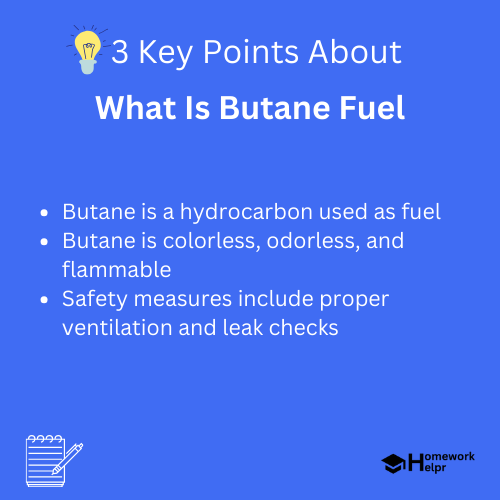📝 Summary
Butane fuel is a hydrocarbon from the alkane family, with the chemical formula (C_4H_{10
What Is Butane Fuel?
Butane fuel is a hydrocarbon that is commonly used as a fuel source. It is part of the alkane family, with the chemical formula (C_4H_{10}). Butane is gained from the natural gas processing and oil refining. Knowing about butane fuel is essential since it plays a critical role in various day-to-day activities, from cooking to heating. Let‚’ explore the various aspects of butane fuel, including its properties, uses, and safety measures.
Properties of Butane
Butane is a gas at room temperature but can easily be liquefied under pressure. Its notable properties include:
- Colorless: Butane is invisible and has no color.
- Odorless: Pure butane does not have any distinctive smell.
- Flammable: Butane can ignite easily, which necessitates careful handling.
- Energy dense: A small amount of butane can release a substantial amount of energy when burned.
The energy density of butane makes it an efficient fuel choice for numerous applications, particularly where portability is crucial. One unique feature of butane is that it can be stored in gas canisters for practical uses, making it convenient for consumers.
Definition
Hydrocarbon: Compounds consisting entirely of hydrogen and carbon atoms. Examples include methane, ethane, and propane.
Uses of Butane Fuel
Butane fuel is incredibly versatile and is utilized across various sectors. Here are some common uses:
- Cooking: Many people use butane for camping stoves, kitchen burners, and portable cookers.
- Heating: Butane can be used in space heaters to provide warmth in homes, especially in outdoor settings.
- Fuel for Lighters: Butane is the primary fuel source in most disposable lighters.
- Refrigerants: Some cooling systems utilize butane as a refrigerant due to its low boiling point.
❓Did You Know?
Butane is sometimes blended with propane to create a mixture known as “butane/propane blends,” which improve performance in colder locations.
These uses demonstrate not only the efficiency of butane as a fuel source but also highlight its importance in our daily lives. Whether you are cooking a meal on a camping trip or just lighting a candle, butane plays a quiet yet significant role.
Environmental Impact
As with any fuel source, butane has its environmental impacts. When burned, it produces carbon dioxide (CO2), a greenhouse gas contributing to climate change. However, it is worth noting that butane generally produces fewer emissions compared to other fossil fuels such as coal or gasoline.
In addition to greenhouse gases, the extraction and refinement processes of butane can lead to oil spills and habitat destruction. Therefore, the importance of sustainable practices cannot be overstated when dealing with butane fuel.
Safety Measures When Using Butane Fuel
Using butane safely is paramount, as improper handling can lead to accidents or hazardous situations. Here are some essential safety measures:
- Proper ventilation: Always ensure that the area is well-ventilated when using butane to prevent gas accumulation.
- Check for leaks: Regularly inspect butane canisters for leaks by applying a soap solution that will bubble if gas escapes.
- Keep away from heat: Store butane canisters away from heat sources, flames, or direct sunlight.
Awareness and education regarding these safety measures can significantly reduce potential hazards when handling butane fuel. Just a bit of precaution goes a long way in ensuring safety.
Examples
For instance, when camping, always use a butane stove in an open area instead of inside a tent to avoid carbon monoxide buildup.
Comparing Butane with Other Fuels
To better appreciate butane, understanding how it compares with other fuels is incredibly useful. Here‚’ a brief comparison with common alternatives:
- Propane: Slightly different chemical composition but similar in uses; propane performs better in colder temperatures.
- Gasoline: More energy-dense but more pollutants; gasoline is often used in vehicles rather than for portable cooking.
- Natural Gas: Typically supplied via pipelines, making it convenient for home heating but less portable compared to butane.
Each fuel has its unique characteristics that cater to specific needs. Evaluating what you need will help you choose the right fuel for your application.
Definition
Flammable: Easily ignited and capable of burning rapidly. Examples include gasoline and alcohol-based fuels.
Conclusion
In conclusion, butane fuel is a significant energy source with various applications, from cooking to heating and more. While it poses some environmental and safety risks, understanding these factors can lead to responsible usage. By making informed decisions about energy consumption, we can utilize butane safely and effectively. Always remember to follow safety guidelines, and consider the environmental implications of your energy choices. Next time you light a stove or a lighter, think about the role butane plays in making your life a little easier!

Related Questions on What Is Butane Fuel
What is butane fuel?
Answer: Butane is a hydrocarbon commonly used as fuel.
What are the uses of butane fuel?
Answer: Butane is used for cooking, heating, and lighters.
Is butane environmentally friendly?
Answer: Butane produces fewer emissions than some other fossil fuels.
What safety measures should be taken with butane?
Answer: Ensure proper ventilation and check for leaks.
